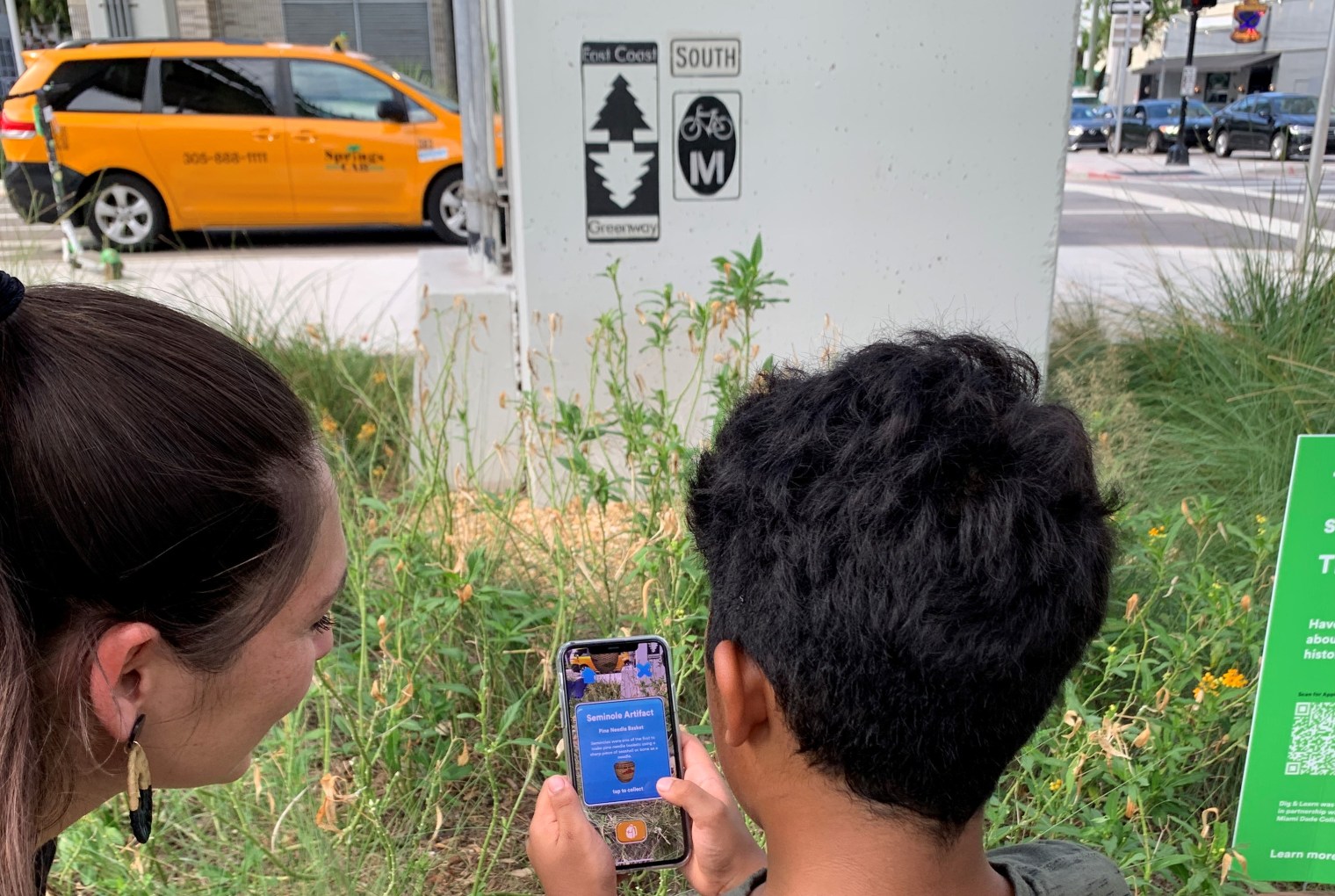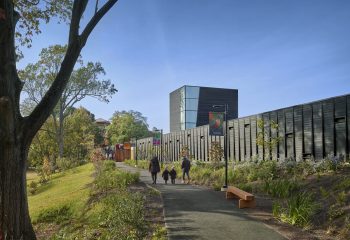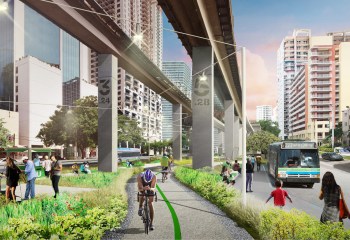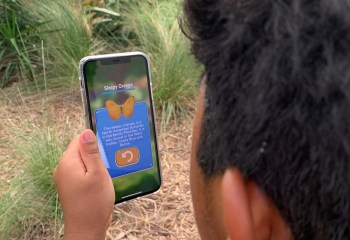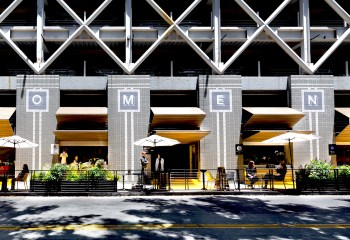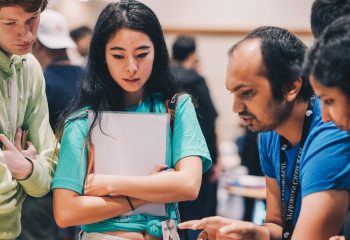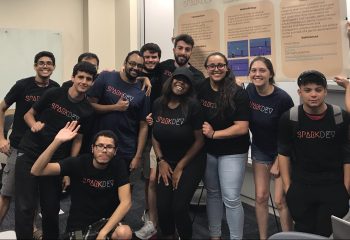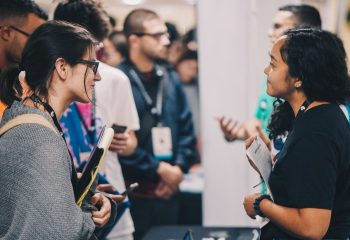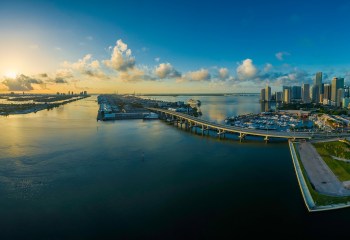The SJDA will develop a sets of three templated engineering plans under a Creative Commons license (CC-BY-SA) to accelerate and reduce the cost of building public spaces in public rights-of-way.
Program Area: Communities
To test, deploy and encourage adoption of technology platforms to facilitate communication, build volunteer resources for non-profits, and provide access to tools and resources for San Jose community groups.
The High Line Network and Miami’s Underline will use Knight’s support to advance key initiatives devoted to revitalizing public spaces through the power of technology
March 15, 2022 — MIAMI — Technology innovations to design public spaces that better serve communities are heading to cities across America, thanks to investments of more than $1 million from the John S. and James L. Knight Foundation. Knight is supporting both the High Line Network, a North American public space peer network led by the High Line, as well as TThe Underline, a 10-mile park and trail beneath the Miami Metrorail.
This latest investment builds on Knight’s longstanding commitment to support informed and engaged communities by investing in public spaces that help residents feel more connected to their cities and their neighbors. Since 2015, Knight has invested more than $100 million in public space projects aimed at fostering strong bonds between communities. With the increased use of technology in the public realm in communities across the country, Knight’s investments at the intersection of public space and technology seek new ways to engage community members.
Knight’s latest commitment includes $250,000 for the High Line Network, a program of the High Line that supports a group of 37 infrastructure reuse projects across America transforming underutilized public spaces into more equitable and vibrant urban landscapes. The High Line Network will use the funds to launch a Tech and Public Space Accelerator, a program empowering community organizations to identify their own technology needs, develop roadmaps for tech innovations, and ultimately implement tech tools to better serve their residents and communities. An advisory board with national leaders from philanthropy, technology and planning industries will steer the organizations as they define their needs and determine next steps.
“Knight’s support will empower our members to get the most out of their technology planning,” said Asima Jansveld, managing director of The High Line Network. “The Tech and Public Space Accelerator aims to give public space organizations a chance to unlock even more funding while putting them in a better position to adapt to the challenges of the future.”
Miami’s The Underline, a member of the High Line Network, will receive up to $800,000 to expand high-speed internet connectivity along the 10-mile public park, trail and art destination under the Metrorail, serving a projected 15 million users per year. Knight has been a key supporter of The Underline since its launch, investing nearly $3 million to date.
This new Knight investment will provide a match of 1 to 4 for government support to expand uninterrupted wireless internet service across the park’s full ten miles, catalyzing an additional $3.2 million in public funds.
The project will lay the foundation for future Underline technology initiatives, from the installation of mobility sensors to the exploration of cutting edge spatial technology such as augmented reality.
“Our ability to create an inviting and innovative visitor experience depends on having reliable, strong internet access throughout The Underline’s entire park,” said Meg Daly, founder and CEO of Friends of The Underline. “About one in four households in Miami-Dade County lack internet access, and this investment will help close our broadband connectivity gap.”
As a whole, the two grants will allow community organizations to meet the immediate technology needs of their residents while creating opportunities to explore how tech can help solve future public space challenges.
Across the country, cities are investing heavily in projects to breathe new life into public spaces, including those that may be neglected or overlooked. Knight research has shown that the use of key public spaces boomed during the pandemic, highlighting how these spaces are central to community resilience. The most successful public spaces put residents at the center of their development while remaining nimble – adapting and innovating during periods of incredible uncertainty. The pandemic has also accelerated the need for digital transformation, and public space leaders are leveraging technology to connect and engage with their communities.
“The pandemic has made clear how public spaces are vital to our society’s long-term health and vitality,” said Kelly Jin, vice president of Knight’s Community and National Initiatives program. “With these two investments, Knight seeks to leverage technology to reshape the experience in public space and communicate to residents in new ways.”
To learn more about Knight’s strategy to invest in technology that transforms and invigorates public spaces, visit: kf.org/publicspacesfuture
###
About The High Line Network
Presented by the High Line, the High Line Network is a group of infrastructure reuse projects—and the people who help them come to life. As cities become denser and land for traditional parks becomes more scarce, residents are finding creative ways to bring greenspace to their neighborhoods. Projects in the High Line Network transform underutilized infrastructure into new urban landscapes. Redefining what a park can be, these hybrid spaces are also public squares, open-air museums, botanical gardens, social service organizations, walkways, transit corridors, and more. For more information about the High Line Network, please visit network.thehighline.org.
About Friends of The Underline
Our mission is to deliver and activate a 120-acre, world-class linear park spanning 10-miles below Miami’s Metrorail that will transform regional mobility and celebrate diversity, culture and lifelong learning. Through innovative urban trails and creative programming, we are connecting people to their environment and each other to create a safe, healthy, equitable, and sustainable community. For more information visit theunderline.org.
About the John S. and James L. Knight Foundation
We are social investors who support democracy by funding free expression and journalism, arts and culture in community, research in areas of media and democracy, and in the success of American cities and towns where the Knight brothers once published newspapers. Learn more at kf.org and follow @knightfdn on social media.
Knight Foundation invests $925K in visionary technology plan for Miami’s Underline, bringing its total support for the world-class public space to $2 million since 2015
On March 15, 2022, Knight Foundation announced a $1 million investment in the Highline Network and Miami’s Underline to transform public spaces with resident-centered technology. Kelly Jin shares more below.
Free and contiguous high-speed internet through a 10-mile corridor serving 250,000 residents. Augmented reality tours that show residents the untold history of their neighborhood’s development. Computer vision algorithms that can identify patterns of how residents use public spaces. These are just a few examples of how cities are harnessing technology to build more dynamic public spaces.
At Knight Foundation, our Community and National Initiatives (CNI) program invests in public spaces because they cultivate strong bonds between communities, attaching residents to their neighbors and their neighborhoods. Since 2015, Knight has invested more than $100 million in public space projects across the country. We believe dynamic and inclusive public spaces are essential for the long-term health and well-being of cities. Over the last two years, the use of public spaces boomed as the pandemic forced residents outdoors to exercise, relax and recharge.
Our research shows that the most successful spaces put residents at the center of development and embrace flexibility and innovation in their planning. And, technology can help make these public spaces more accessible and engaging for everyone — for example, by making parks more accessible to residents with disabilities, to support English language learners and ultimately breaking down barriers between residents and decision-makers.
We’re doubling down on our investments at the intersection of technology and public space because we believe technology is a critical element of engaging public spaces that creates more informed and engaged communities.
Today, Knight announced two grants that highlight our emphasis on tech as a means to achieve this goal. One of them will go to The High Line Network, a program of the High Line that supports a group of 37 infrastructure reuse projects across North America focused on transforming underutilized urban infrastructure into more inviting landscapes. The network will use Knight’s $250,000 investment to launch an accelerator program, giving community organizations more resources to identify their own technology needs and implement tech tools to better serve their residents.
The Underline, a member of The High Line Network, will use the other grant to expand high-speed internet connectivity along the entire 10-mile public park, trail and art destination under Miami’s Metrorail. This grant is especially notable because it demonstrates how community planners can use private funds to attract more public support for technology development projects. Knight’s $800,000 investment will secure an additional $3.2 million in federal, state and local dollars for The Underline’s technology initiatives. Eventually, this project will increase high-speed internet access for millions of users.
Investments like these demonstrate how technology can responsibly increase community engagement with public spaces. This year, Knight’s public space team (more about them below) seeks to identify opportunities that help answer the question, How can technology in the public realm responsibly improve the lives of our residents and encourage more people to participate in civic life? We seek opportunities that:
- Grow community knowledge and talent at the intersection of public space and public realm; and
- Pilot new ways of engaging residents with local public spaces and measuring attachment through place using data and technology.
Knight Foundation public space team
- Lilly Weinberg, senior director of Knight’s CNI program, brings in her knowledge and experience in community-led development of public spaces and expertise in co-leading Knight’s public spaces strategy and the Foundation’s multimillion dollar investments in 18 small-to-midsize Knight communities.
- Kyle Kutuchief, Knight’s Akron program director, who was recently appointed Knight representative on the Reimagining the Civic Commons national steering committee, is ideally suited to identify best the opportunities and challenges our local communities face with his experience leading the Foundation’s work in Akron, Ohio.
- Bernardo Rivera Munozcano, Knight’s CNI program officer, contributes his experience with innovative approaches to policy making and ethical use of technology gained from working for two of the largest cities in the Americas.
We look forward to exploring these questions as we work to make public spaces welcoming to everyone, and I encourage you to reach out to our public spaces team members. Knight’s research shows that effective public spaces must be designed with residents at the center of the work. Technology plays a key role in helping public spaces meet the needs of diverse communities, and it unlocks the benefits of our connected society. Smart, tech-powered community development could help ensure our parks, waterfronts and urban landscapes stay vibrant for decades to come.
Kelly Jin is the vice president for Community and National Initiatives at Knight Foundation.
Knight Foundation invests $925K in visionary technology plan for Miami’s Underline, bringing its total support for the world-class public space to $2 million since 2015
To promote adoption of the Palace Strategy by librarians, the Palace Manager by libraries, and the Palace App by everyone in the United States.
To strengthen technology expertise within the U.S. Congress by supporting the Congressional Innovation Fellowship, which places an even number of technologists in congressional offices of both major political parties and works to convert fellows into full-time employees.
To support expansion efforts connecting residents in Miami with the ISeeChange platform on which they can collect imagery and local flooding, heat and pollution data that can be used by nonprofits and local government to enhance their climate adaptation and mitigation strategies.
Knight support will enable the San Jose Downtown Association to analyze mobility data to guide the urban core’s economic recovery.
SAN JOSE – The John S. and James L. Knight Foundation and San Jose Downtown Association (SJDA) are partnering on an initiative to create a more vibrant downtown San Jose for residents and visitors to live, work, study and play.
Knight is investing nearly $1 million in SJDA’s Beautiful Tableau initiative, a five-year effort to create a better future for downtown San Jose by using data to provide insights for city planners and the downtown community to build an urban center that is innovative, vibrant, equitable and inclusive.
“San Jose can learn from shared experiences and challenges during the pandemic to build a city that amplifies our diversity, accelerates our innovation, leverages our history, and builds equity by connecting residents and business owners with those who wish to invest in the city’s future,” said Christopher Thompson, Knight’s San Jose director. “ Now, we’re moving forward with this unique opportunity to reimagine a downtown that is welcoming, safe and desirable for everyone.”
The Beautiful Tableau project is expected to start small and grow over the years. SJDA will work with executives, business and property owners, artists, investors, developers and others for input on project decisions.
The project intends to:
- Gather information that’s useful to fill empty storefronts and enhance merchandising in existing storefronts;
- Make a list of favored native plants to populate pedestrian paths;
- Identify best sites for public art placement;
- Establish temporary art on fencing separating visitors from large construction projects;
- Collect evidence that raises the level of street life improvements beyond murals, decorative lighting and planters.
“The definition of ‘tableau’ is a memorable and dramatic image or scene,” said Sarah Billings, SJDA Street Life Manager. “We’re inspired to collaborate with our partners to evoke new opportunities downtown for our residents, workers, students and visitors by filling in the spaces between our established districts.”
Over the five years of the grant, SJDA wants to strengthen the public experience along Santa Clara from the Diridon Station to City Hall; between the Historic District and South First Area (SoFA); on routes to and from Guadalupe River Park; and on Park Avenue between Market Street and Almaden Boulevard. SJDA also wants to connect San Jose State with the rest of downtown.
Knight’s investment will kickstart a sustainable means of building, allocating resources and adding onto downtown during the pandemic and beyond.
“With the Beautiful Tableau initiative, we’re reaching for a higher bar of excitement and vivacity than we’ve ever experienced,” said Chloe Shipp, SJDA Director of Public Space Operations. “We’re going to make sure we’re ready for the eruption of construction we expect over the next several years.”
More than 50 office and residential high-rise projects are already in downtown’s planning hopper, and Google plans to create a multi-use transit village called Downtown West next to an expanded Diridon Station.
Portions of Knight’s commitment will be used to crunch numbers that will assist with downtown branding, marketing and communications; and expand downtown’s capacity for research and development. The objective is to build confidence among stakeholders and encourage additional investment.
Beautiful Tableau builds off the successes of two impactful Knight investments with SJDA:
- The MOMENT shops in San Pedro Square added four ground-floor micro retail spaces by renovating a section of the Market-San Pedro Square parking garage. Opened in May 2018, the award-winning MOMENT project has provided 15 entrepreneurs a chance to test their concepts in a storefront location.
- A five-year Street Life initiative completed in June 2020 resulted in dozens of downtown decorative and landscape improvements, including an explosion of colorful crosswalks, LED lighting and murals. The Street Life manager position initially funded through the grant is now a permanent, full-time role sustained through the Property Business Improvement District.
“Knight’s support and the leveraging of funds provided by property owners, businesses and City of San Jose resources resulted in a more dynamic downtown environment pre-COVID, which sets the table for the Beautiful Tableau initiative,” Shipp said.
###
About the John S. and James L. Knight Foundation
We are social investors who support democracy by funding free expression and journalism, arts and culture in community, research in areas of media and democracy, and in the success of American cities and towns where the Knight brothers once had newspapers. Learn more at kf.org and follow @knightfdn on social media.
About San Jose Downtown AssociationSan Jose Downtown Association (SJDA) enhances the unique and diverse character of downtown San Jose by providing a clean and welcoming urban environment, public space improvements, marketing and community programming and advocacy on issues that affect business and property owners. Currently, SJDA is focused on assisting businesses through economic recovery and planning beyond the pandemic. sjdowntown.com
Image (top) of the San Jose Downtown Ice rink by Greg Ramar.
As Miami’s tech community grows, CodePath will leverage Knight’s investment to expand and launch programming at three area colleges to connect students to tech careers.
(November 22, 2021) — As Miami emerges as an international tech hub with increased demand for skilled talent, the John S. and James L. Knight Foundation announced today a $2.25 million investment in CodePath to expand its programming at Florida International University (FIU) and launch new programs at Florida Memorial University (FMU) and Miami Dade College (MDC).
CodePath, a national nonprofit seeking to increase diversity in computer science and engineering, will partner with the three landmark Miami higher education institutions to:
- complement their computer science curricula to align with industry needs;
- prepare students for competitive internships;
- place students in software engineering roles at leading tech companies.
“Miamians are talented, full of grit and determination. Increasingly, they seek to bring those attributes to careers in tech,” said Raul Moas, Knight’s Miami program director. “By investing in CodePath, we are investing in the aspirations of Miamians and key educational institutions which enable our community to succeed.”
CodePath provides no-cost software engineering courses, career services and access for computer science students to successfully complete their undergraduate education and land competitive technical roles after graduation. Since 2017, CodePath has served more than 10,000 students, 70% of which come from Black, Latino/a or low-income backgrounds.
“We must create more support structures to cultivate a tech talent pool that reflects Miami’s population,” said Michael Ellison, CEO and co-founder of CodePath. “Through our Knight partnership, we will serve and attract college students to join our tech movement and create a larger, more diverse talent pipeline for employers.”
In 2020, CodePath launched its programming at FIU with a course on Android development. Today, multiple CodePath courses are now integrated into FIU’s computer science curriculum, and the nonprofit to date has taught nearly 100 students, arming them with industry relevant technical skills, including web and mobile development, cybersecurity and technical interview preparation.
“The support that CodePath is able to give students is invaluable. Through their guidance, I found the career path I want to pursue in computer science,” FIU student Anthony Pena said. “During the program, I built an award-winning mobile application, secured technical internships at Meta (formerly known as Facebook), Amazon and other high growth tech companies. SXSW EDU 2022 selected me to speak. Also, in March, I will start working full-time as a software engineer, while I continue to pursue my bachelor’s degree.”
This investment builds on Knight’s support of Miami Tech, including a $15 million commitment in Florida International University, the University of Miami and Baptist Health South Florida announced in February of this year. As part of the announcement, FIU established the Knight Foundation School of Computing and Information Sciences, UM expanded its Institute of Data Science and Computing and Baptist Health launched a health care innovation fellowship. In September, Knight announced $510,000 in investments to four local organizations and entities that help boost a sense of community among tech practitioners in the city.
“With this investment by CodePath, FIU has a unique opportunity to further expand our strategic efforts to prepare a new generation of tech workers for 21st century jobs,” said FIU President Mark B. Rosenberg. “By providing all students with learning opportunities focused on excellence and innovation, we are positioning them to be change makers and problem solvers in the tech sector.”
“The need for individuals with quality technical skills are in high demand, and Florida Memorial University is committed to helping our students succeed in all areas of education, especially in the realm of computer science and engineering,” said Dr. Jaffus Hardrick, Florida Memorial University President. “We greatly appreciate the commitment of CodePath and the Knight Foundation for cultivating opportunities for underserved students here in South Florida.”
“This investment from Knight Foundation will accelerate the pathway for Miami Dade College students to economic prosperity through the supplemental resources and services provided by CodePath,” said Miami Dade College President Madeline Pumariega. “We know our students reflect the rich diversity of our community, and their passion, talents and perspectives will enhance Miami’s tech ecosystem. We are proud to join our partner institutions in this endeavor.”
###
About the John S. and James L. Knight Foundation
We are social investors who support democracy by funding free expression and journalism, arts and culture in community, research in areas of media and democracy, and in the success of American cities and towns where the Knight brothers once had newspapers. Learn more at kf.org and follow @knightfdn on social media.
About CodePath
CodePath transforms computer science education for underrepresented minorities and students from low income backgrounds at over 300 colleges and universities. We offer free, supplemental courses in cybersecurity, mobile app development and technical interview preparation, as well as career services to create successful pathways for students to achieve technical excellence. To date, CodePath has served over 10,000 students, of which 70% self-identify as Black, Latino/a, or come from low-income backgrounds. By working closely with partners like Andreessen Horowitz, Cognizant, Comcast, Meta, Walmart, and Workday, CodePath is systematically changing CS programs to increase diversity in tech. CodePath is a 501(c)(3) nonprofit. To learn more, visit www.codepath.org
To design and implement a process that will enable business to seek approval, receive permits, access ARPA funds for construction and permits, and measure success of Parkets to build economic security and urban vibrancy on San Jose streets.
To create a set of best practices, and replicable innovations that help city leaders utilize digital infrastructure to facilitate community involvement, specifically with the inclusion of communities that were historically excluded, and to improve the design, construction, maintenance and equitable use of infrastructure.
